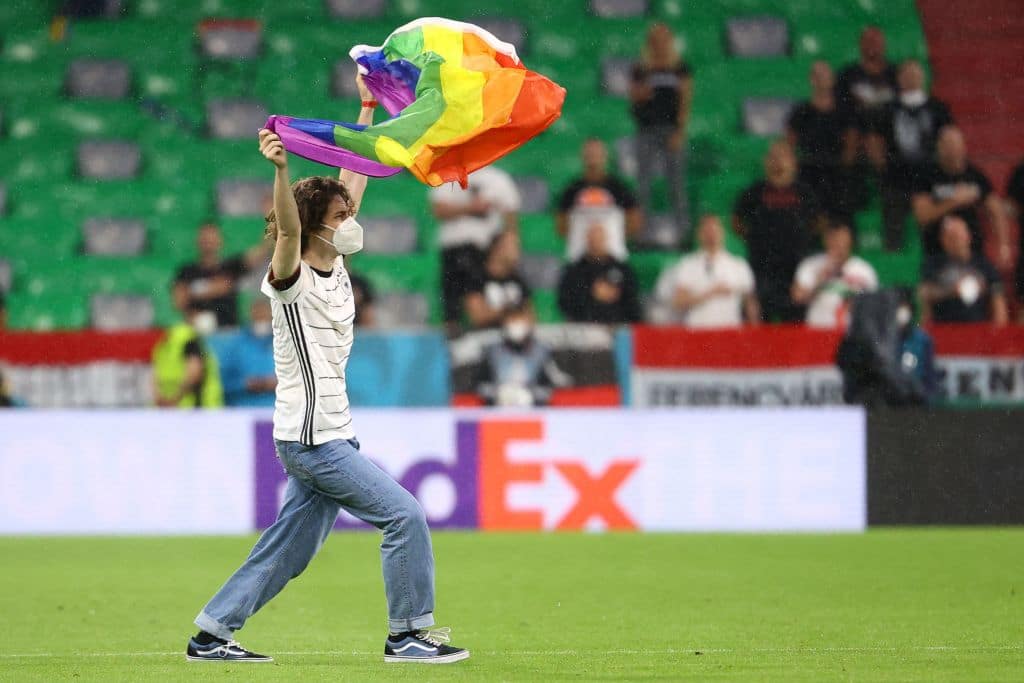Incredible moment football fan invades pitch with Pride flag during Hungary’s national anthem
A pitch invader ran out with a Pride flag at the start of the Germany v Hungary game. (Markus Gilliar/Getty)
The crowd erupted into cheers at Wednesday evening’s football match between Hungary and Germany when a supporter ran out onto the pitch with a Pride flag as the Hungarian national anthem played.
The football fan ran out wielding the flag and stood in front of the teams, but they were tackled to the ground by security guards just moments later.
Supporters continued to cheer the defiant football fan on as they were led away by security guards.
Video footage of the incredible moment was shared on Twitter and quickly racked up tens of thousands of views, with football supporters heaping praise on the courageous fan.
One Twitter user said the moment was the “highlight of the match”, while others labelled the pitch invader a “hero” for drawing attention to LGBT+ rights.
Oh wow! One spectator just ran on with a rainbow flag during the Hungarian national anthem. Loud cheers from the Germany block pic.twitter.com/EDJzdV0tbx
— Archie Rhind-Tutt (@archiert1) June 23, 2021
YES!🏳️🌈 I love him. He ran across the pitch during the Hungry National Anthem waving a rainbow flag. 🏳️🌈👌.⤵️#EURO2020 #GERHUN pic.twitter.com/b2hAHxCafk
— Paul Dunphy Esquire. 🏳️🌈 #HireTheSquire! (@pauldunphy) June 23, 2021
Not all heroes wear capes 🏳️🌈#EURO2020 #GERHUN #pride pic.twitter.com/E5ft826aDP
— Madame Y (@yleniaindenial) June 23, 2021
Incredible photo: Pitch invader takes field with Rainbow Flag while Hungarian National Anthem is played. This after UEFA banned Munich stadium from lightning in #Pride colors for German game against Hungary, a nation which just banned LGBTQ+ content for under 18s. To Love🇩🇪🌈 pic.twitter.com/nDC8MSP4KE
— roger bennett (@rogbennett) June 23, 2021
The incident comes after UEFA found itself embroiled in controversy when it declined Munich City Council’s request to light up the Allianz Arena in the rainbow colours for the Germany v Hungary match.
Dieter Reiter, mayor of Munich, had requested that the stadium be lit up in the rainbow colours in response to a harsh, discriminatory law passed just last week in Hungary that bans the “promotion” of LGBT+ issues.
Reiter said the move would be “an important sign of tolerance and equality” in response to the law – but UEFA declined the request, saying it would be a “political” statement.
Human rights groups filled the stadium with Pride flags in response to Hungary’s oppressive laws
Despite UEFA’s stance, the stadium was filled with Pride flags on Wednesday evening (23 June) thanks to the efforts of LGBT+ and human rights groups.

Football supporters who went through the Fröttmaning subway station were met by volunteers from Amnesty International Germany and S’AG Munich, who were handing out Pride flags.
Rainbow flags ultimately outnumbered German flags at the game, according to The Independent.
Others turned up at the match specifically to protest against Hungary’s treatment of its LGBT+ community, while others wanted to take a stand against UEFA’s controversial decision to refuse requests to light the stadium up in the rainbow colours.
“We’re here to protest the oppressive laws of Hungary against members of the LGBTQ community,” demonstrator Julian Krusenberg told the Associated Press.
Many Hungarian fans were reportedly confused by the sea of Pride flags, while few stopped to accept the flags from human rights groups.
The spectacular show of solidarity comes just days after lawmakers in Hungary passed its anti-LGBT+ law, which makes it illegal to depict or discuss different gender identities and sexual orientations in schools.
The law also prohibits the dissemination of LGBT+ content in advertising or media where minors could see it. Furthermore, the legislation establishes a government-approved list of organisations which are allowed to provide sex education in schools.
Human rights groups have spoken out against the legislation, with Amnesty International Hungary director David Vig condemning its passage as “a dark day for LGBT+ rights”.






